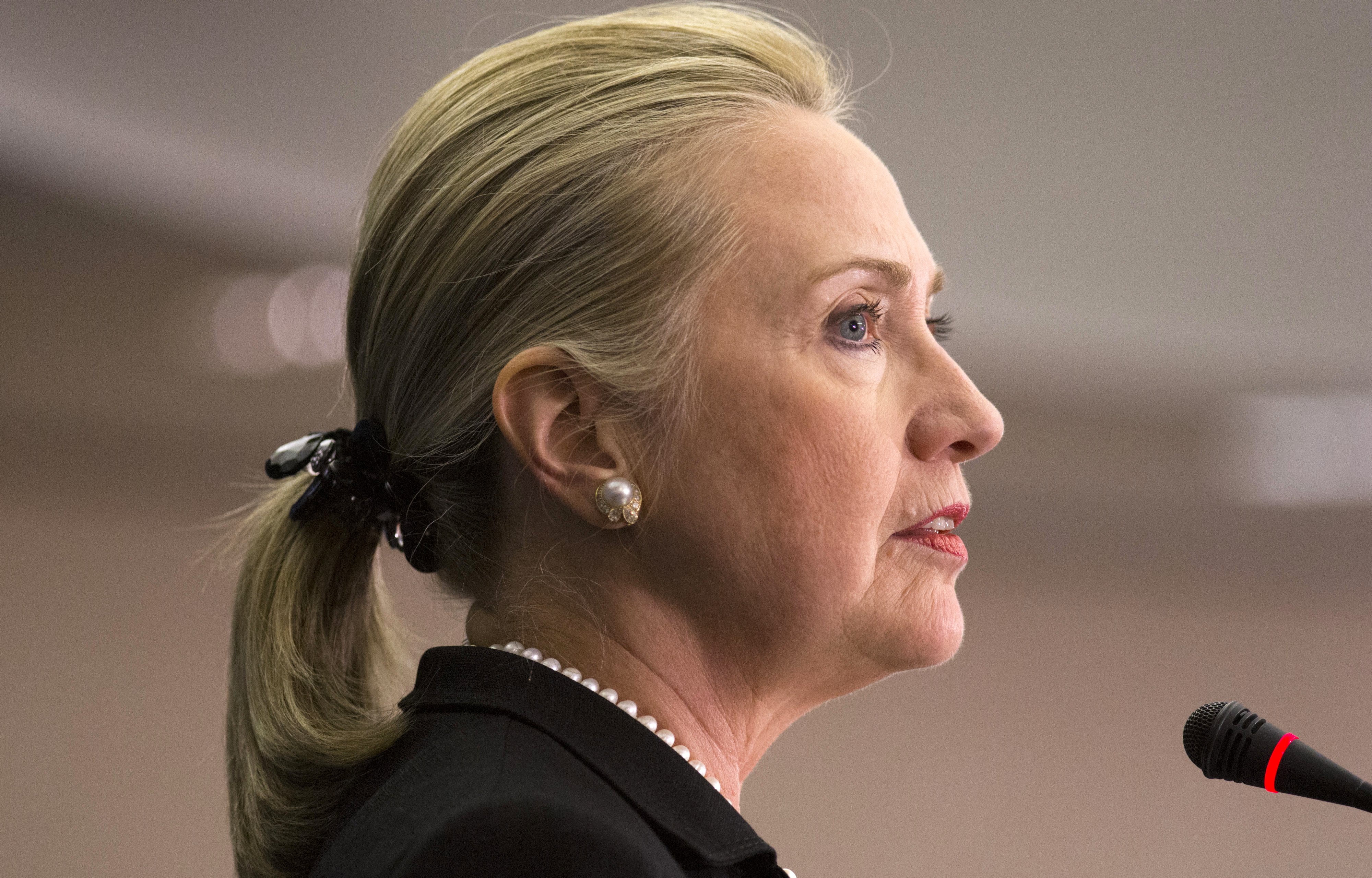Clinton: U.S. must stick by Arab world's democracies
Saturday, October 13, 2012
By MATTHEW LEE and BRADLEY KLAPPER
Associated Press
WASHINGTON - Secretary of State Hillary Rodham Clinton, addressing criticism of the Obama administration's handling of a deadly attack on U.S. consulate in Libya, on Friday defended the need for American diplomats and aid workers in the Arab world's young democracies, even amid a growing threat from al-Qaida spinoffs.
"We will not retreat," she said in a speech at a Washington think tank.
"We will never prevent every act of violence or terrorism, or achieve perfect security," Clinton said. "Our people can't live in bunkers and do their jobs. But it is our solemn responsibility to constantly improve, to reduce the risks our people face and make sure they have the resources they need to do their jobs."
Her address at the Center for Strategic and International Studies comes as Republicans seized on the Sept. 11 attack on the U.S. consulate in Benghazi, Libya, as a sign of what they say is the administration's weak foreign policy, intelligence failures and a laissez-faire attitude toward security at diplomatic missions in hot spots. She spoke a day after a Yemeni security official at the U.S. Embassy in Sanaa, Yemen, was assassinated on his way to work.
With only weeks before the presidential election, the outrage has crystallized around Vice President Joe Biden for claiming in Thursday's debate with Republican vice presidential nominee Paul Ryan that "we weren't told" about requests for extra security at the consulate where assailants killed the U.S. ambassador and three other Americans.
Congressional hearings this week revealed that the State Department was aware of, and rejected, several requests for increased security in Benghazi. Spokesman for both the State Department and the White House took pains Friday to make clear that Biden's "we" referred to the White House, where such requests would not go.
Clinton said she wanted to find out exactly what happened in Benghazi more than anyone, but did not go into the specifics of the consulate's security. Instead, she focused on the larger question of why the U.S. diplomats were stationed in the largely lawless Libyan city.
"Diplomacy, by its very nature, is often practiced in dangerous places," she said.
Twenty-one months into the Arab Spring, Clinton stressed that the promise of new democracies in an area of the world long dominated by autocratic rulers has not been lost. She said the U.S. needed to keep fostering the elected governments and free citizens who, she hoped, would define the region's future.
"For the United States, supporting democratic transitions is not a matter of idealism. It is a strategic necessity," she said. "We will not pull back our support for emerging democracies when the going gets tough. That would be a costly strategic mistake that would undermine both our interests and our values."
The main strains of criticism from Republican presidential nominee Mitt Romney and other Republicans are that the U.S. is failing to effectively shape new Arab governments such as Libya and Egypt and that U.S. security at its diplomatic installations has been inadequate.
The secretary of state stressed that the transitions "are not America's to manage, and certainly not ours to win or lose." But she said a U.S. leadership role was important "to strengthen democratic institutions, defend universal rights, and drive inclusive economic growth.
"That will produce more capable partners and more durable security over the long term," Clinton said.
On the question of security, she said less.
On Wednesday, two former security officials testified before Congress that their requests for more manpower were either ignored or rejected. Senior State Department officials acknowledged that that was the case but insisted that there was no evidence that more security would have thwarted or otherwise mitigated the attack.
Biden said in Thursday's vice presidential debate, "We did not know they wanted more security again."
He also defended the administration's early explanation that the attack sprang from anti-video protest, saying that had been the judgment of intelligence agencies at the time.
Clinton agreed at an earlier appearance Friday, speaking to reporters alongside Italy's foreign minister.
"We do not have all the answers. No one in this administration has ever claimed otherwise."
"We are providing the best information we have at that time and that information continues to be updated, it also continues to be put into context and more deeply understood through the process we are engaged in," she said.
There are three separate investigations into the attack going on now: an FBI probe into the deaths of the four Americans, an independent inquiry by a panel appointed by Clinton and the congressional hearings.
In her address, which focused particularly on North Africa, Clinton stressed that extremists were trying to hijack democratic transitions under way. She warned of al-Qaida in the Islamic Maghreb's growing reach from its stronghold in northern Mali, just south of Libya.
"Last month's violence revealed strains of extremism that threaten these nations, as well as the broader region and the United States," Clinton warned. "On the other hand, we've seen actions that would have been hard to imagine just a few years ago: Democratically-elected leaders and free people in Arab countries standing up for a peaceful, pluralist future.
"It is too soon to say how these transitions will play out," she said. "But what's not in doubt is that America has a big stake in the outcome."
